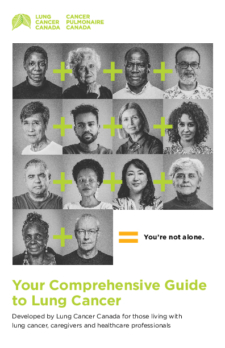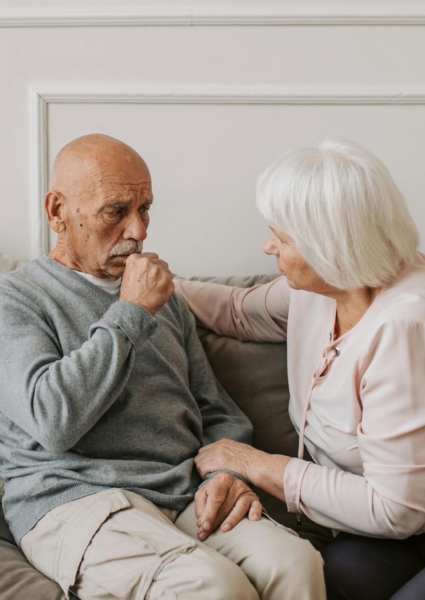Pain
Lung cancer and its treatments can lead to pain. If not addressed, pain can diminish your quality of life and affect your ability to cope with treatments. It is critical to work with your healthcare team to manage pain effectively.
Various methods can help alleviate pain. These methods include pain medications, palliative radiation and chemotherapy to shrink the tumour, and procedures to drain excess fluid from the lungs. Furthermore, if cancer has spread to bones such as the spine and causes discomfort, surgical interventions may be beneficial. Alternative therapies, such as acupuncture and massage therapy, and behavioural strategies like meditation may also help with pain.
If you experience sudden, new, or escalating chest pain, go to an emergency room immediately. If you experience a new onset of pain or if your existing pain intensifies, consult your doctor without delay.
For tips and strategies to manage pain visit your comprehensive guide to lung cancer.
Shortness of breath
Living with shortness of breath can be challenging. For some, it might be mild, causing occasional breathlessness. For others, it might be constant and more bothersome. Being short of breath may make it hard to do regular activities like getting dressed and cooking. It can also lead to increased fatigue, anxiety, and distress. When you’re short of breath, you might tighten your chest muscles, breathe faster, or feel afraid, anxious, panicked, or uneasy.
Shortness of breath can have many causes, such as lung infections, anxiety, tumours blocking an airway, or buildup of fluid around the lungs. Depending on its cause, your doctor may recommend a combination of treatments. This could include opioid painkillers, procedures to drain excess fluid from the lungs, and palliative treatments to shrink a tumour blocking the airways. You may also receive oxygen from an oxygen tank or medications to help you relax and feel less anxious.
If you experience any of the following, see your doctor immediately:
- A sudden difficulty in breathing over a short time
- Feeling dizzy, increased heart rate, or unusually pale skin accompanying shortness of breath
- Feelings of nervousness while struggling to breathe
- Sudden breathlessness upon waking up
- Noisy breathing
For tips and strategies to manage shortness of breath visit your comprehensive guide to lung cancer.
Coughing
A cough can be caused by various complications often associated with lung cancer. This includes situations where a tumour blocks an airway, inflammation of the lungs due to radiation therapy, or a buildup of fluid around the lungs. Other lung conditions, such as infections, asthma, or bronchitis, can also contribute to coughing.
Treatment for a cough depends on its root cause. They may involve shrinking the tumour blocking the airway, using antibiotics to treat infections, or using cough suppressants and opioid medications for relief.
If you develop a new cough or notice any changes in your existing one, consult your doctor immediately.
For tips and strategies to manage coughing of breath visit your comprehensive guide to lung cancer.
Fatigue
Fatigue is more than just feeling tired. It is a persistent lack of energy characterized by constant tiredness and exhaustion. Fatigue is a common symptom of cancer and a common side effect of many lung cancer treatments. In some people, fatigue goes away when treatment is completed, but in some, it can be long-lasting.
Fatigue can affect many aspects of your quality of life, including your physical, psychological, and social well-being. It can limit your ability to do day-to-day activities and cope with cancer. It also can affect your memory.
It’s crucial to communicate with your doctor about the extent and nature of your fatigue. They might order blood tests or provide recommendations on effective management strategies.
For tips and strategies to manage fatigue visit your comprehensive guide to lung cancer.


